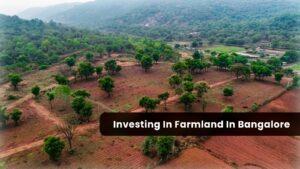Real estate investing differs from other types of investing in a number of distinctive ways. They consist of the possibility of long-term appreciation, the capacity to produce passive income through rental properties, the utilization of mortgage leverage, and the capacity to profit from tax advantages like depreciation deductions. Yet real estate investing also entails large up-front costs and hazards including market oscillations and property damage.
Despite the fact that managed farmland is a sort of real estate, it is used only for farming and is overseen by a qualified farm manager. Managed farmland, unlike conventional real estate, is not often used for residential or commercial purposes and requires specialized knowledge and expertise to manage properly. Moreover, managed farmland frequently makes money by growing crops or renting it to farmers, as opposed to traditional real estate, which makes money by charging rent or selling the property.
Many elements and unique conditions determine whether managed farmland or real estate is preferable. These are some considerations to think about:
Investment Objectives:
Depending on an individual’s investing objectives, managed farmland or real estate may be preferable. Real estate can be a better choice if the aim is to produce rental income. Managed farmlands may be a preferable option if the objective is to invest in a product like agriculture.
Risk Tolerance:
Managed agriculture and real estate can come with varying degrees of risk. Managed farmlands are susceptible to climatic conditions, pest infestations, and shifts in the price of commodities. Property damage, tenant evictions, and market volatility can all affect real estate. Whatever investment is best for a particular person will depend on their risk tolerance.
Management Requirements:
Farmlands and real properties that are managed may have different management requirements. Real estate demands expertise of property management, while managed farmlands require understanding of agricultural operations. Which alternative is preferable may depend on how much time and effort must be put into managing the investment.
Location:
The investment’s location may be a crucial element. Rural locations might have more farmland, whereas urban areas might have more real estate. What type of investment is preferable might be influenced by the availability of suitable land or assets.
Depending on a person’s situation and objectives, managed farmland and real estate can both be great investment choices. However, managed farmland is frequently regarded as a superior investment to real estate for a number of reasons:
Income Stability:
Farmland can generate stable revenue through the sale of cattle, the production of crops, or even by renting the land to other farmers. On the other hand, real estate may have vacancies or shifting rental rates.
Appreciation:
Farmland can increase in value over time, particularly when the global population and food demand both grow. Real estate can also increase in value, but it is more susceptible to changes in the market and the status of the economy.
Economic Benefits:
Farmland may be eligible for tax breaks, including deductions for farming-related expenses and conservation easements. Although they are frequently not as important, real estate may also have certain tax advantages.
Inflation Protection:
Farmland can provide some protection against inflation because the cost of food tends to increase along with inflation. Although it is more dependent on the local market and location, real estate can also provide some protection against inflation.
Environmental Advantages:
Managed farmland can also assist the environment by preserving open space, safeguarding wildlife habitats, and encouraging sustainable agricultural methods. These environmental advantages could not be present in real estate.
Conclusion
Ultimately, managed farmland can offer a secure, appreciating investment with tax advantages and benefits for the environment.
By investing with Mogg’s Estates, you may take advantage of all these wonderful perks as well. We are a managed farmland company in Bangalore that works to get you access to farmlands near to Bangalore and then manages them on your behalf so you can enjoy all the benefits without having to go through drawn-out legal processes and laborious farming operations. Contact us at 9513655556 for more information or send your contact information to info@moggs.in.



